Historic Cafés: crossroads of art and culture in Italy, Europe and the world
Historic cafés are more than just places to enjoy an espresso or cappuccino. They are spaces for meeting, cultural exchange and artistic inspiration. In this article, we will explore some of the most significant cafés linked to the cultural and artistic world in Italy, Europe and around the world. These places intersect the stories of artists, intellectuals, writers and revolutionaries, creating a unique union between the passion for coffee and human creativity. We will begin our journey in Italy, the cradle of the Renaissance and coffee, and then move to the rest of Europe, where coffee has played a key role in the intellectual life of the continent. Finally, we will explore historic cafés outside of Europe, demonstrating how these cultural oases have influenced history and art around the world.
Italy: The Cradle of the Renaissance and Coffee
Italy, a land of art and culture, is also the home of some of the most iconic historic cafés in the world. These places are not just destinations for coffee lovers, but true living museums of the country's cultural history.
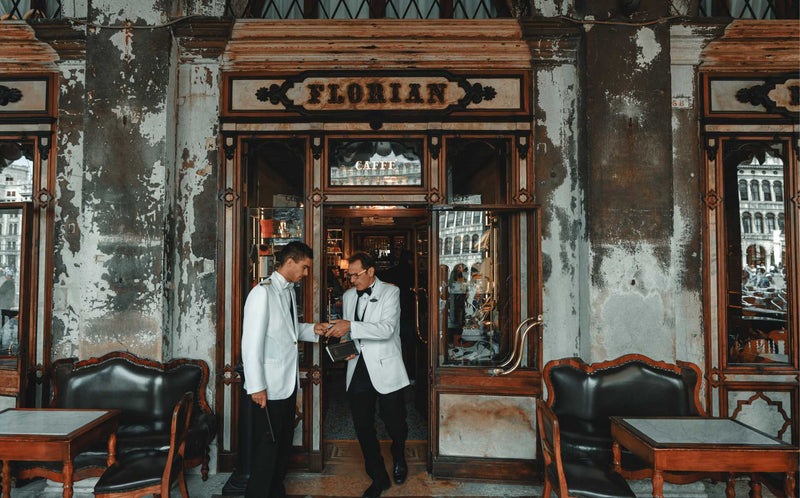
In the heart of Venice, Caffè Florian stands as one of the oldest cafés in Italy and one of the oldest in Europe. Founded in 1720, this café has seen some of the greatest names in literary and artistic history pass through its doors. Byron, Goethe and Casanova are just some of the celebrities who have crossed the Florian's threshold in search of inspiration. The elegant atmosphere and walls adorned with works of art create an aura of elegance that continues to fascinate visitors.
Another cornerstone of Italian culture is Caffè Greco in Rome. Founded in 1760, this café was a meeting point for internationally renowned artists and writers. Keats, Shelley and Goethe are just some of the brilliant minds who flocked to the Greek in search of stimulation. The interior of the café is a riot of works of art and memorabilia that tell the story of this place and its central role in the Roman cultural panorama.
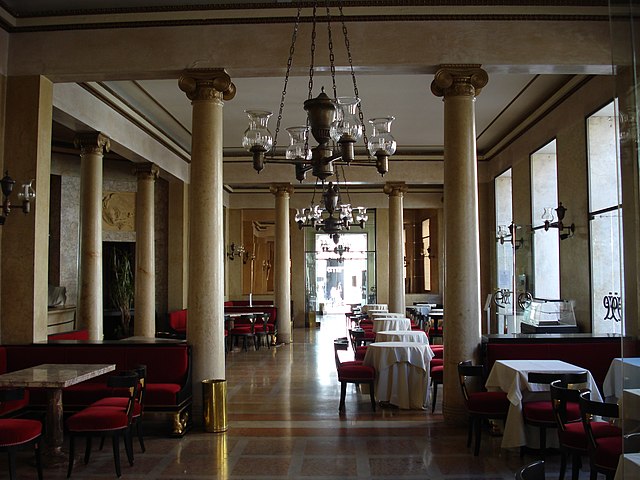
By Orric from Italian Wikipedia, CC BY-SA 3.0, https://commons.wikimedia.org/w/index.php?curid=77528598
The Caffè Pedrocchi, known as the "Café without doors", was a meeting point for students, intellectuals and revolutionaries. Located in the heart of Padua, this café is known for its neoclassical architecture and culture-soaked history. Pedrocchi is a place of interest not only for tourists but also for culture lovers who wish to immerse themselves in an atmosphere full of history.
Europe: From the Belle Époque to the Literary Salons
Europe has seen its historic cafés become real meeting places for the continent's brightest minds. From Paris to Vienna, these cafés were the hub of European intellectual life for much of the 20th century.
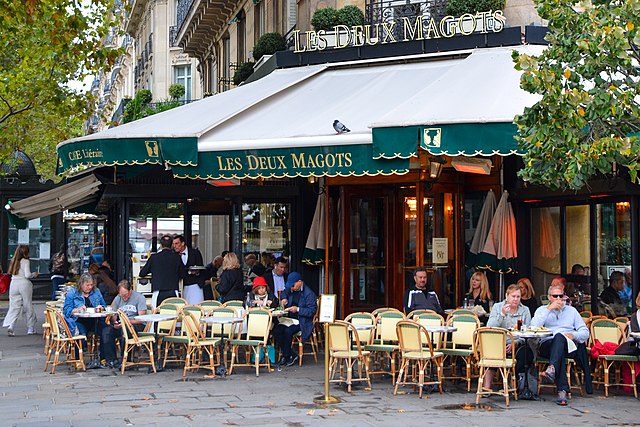
By Cheng-en Cheng from Taichung City, Taiwan - File:Les Deux Magots, Paris 25 September 2019.jpg, CC BY-SA 2.0, https://commons.wikimedia.org/w/index.php?curid=92820354
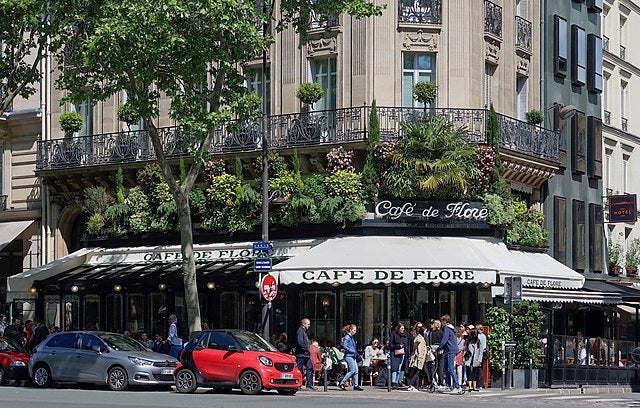
By Celette - Own work, CC BY-SA 4.0, https://commons.wikimedia.org/w/index.php?curid=79542791
In the lively Saint-Germain-des-Prés neighborhood of Paris, Les Deux Magots and Café de Flore have become legends in French culture. These two cafés, located opposite each other, hosted some of the brightest minds in 20th century literature and philosophy. Names such as Sartre, de Beauvoir and Camus are just some of the regulars at these cafés, where lively debates on philosophy, literature and politics took place. The bohemian atmosphere of these places made it possible for artists and thinkers to meet and exchange ideas.
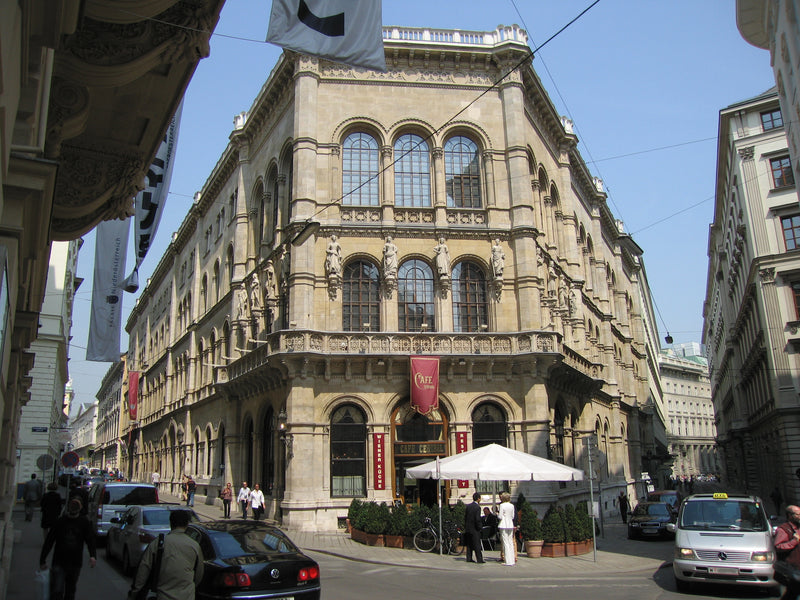
By User:Florian Prischl - Own work, Public domain, https://commons.wikimedia.org/w/index.php?curid=1076121
Founded in 1876, Café Central in Vienna it was a meeting point for intellectuals of the caliber of Freud, Lenin and Trotsky. Its sumptuous architecture and refined atmosphere have made Café Central a point of reference for culture lovers from all over the world. Here, philosophical conversations intertwine with the scent of coffee, creating a unique and thought-provoking environment.
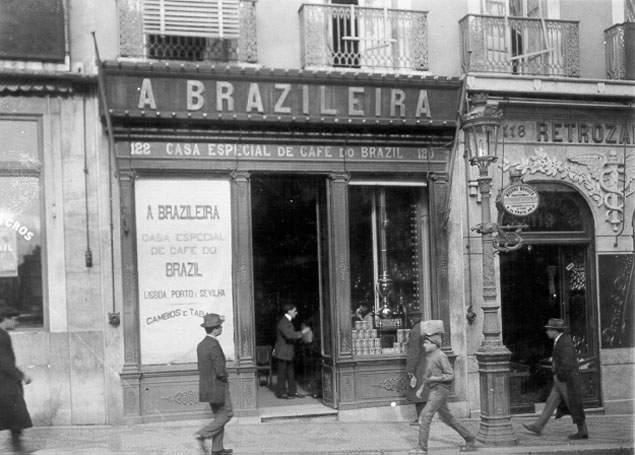
By Joshua Benoliel - Arquivo Municipal de Lisboa, Public domain, https://commons.wikimedia.org/w/index.php?curid=4031996
Moving west, to Lisbon, in Portugal, there is A Brasileira, a café known for being the meeting place of the famous poet Fernando Pessoa. The bohemian atmosphere and fascinating history of this place make it a must-see for anyone visiting the Portuguese capital. Visitors can imagine Pessoa sitting at a table, jotting down his poetic inspirations while the world passes by outside the window.
In the World: Beyond Europe
Historic cafés are not an exclusive privilege of Europe. Around the world, these places have played a vital role in inspiring artists and writers, becoming an integral part of the history and culture of their respective nations.
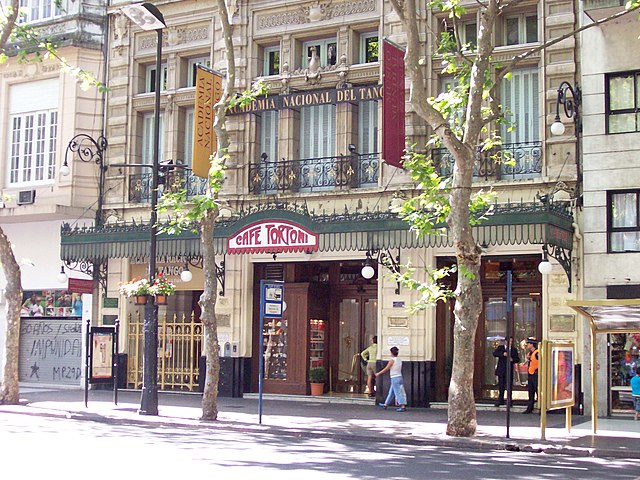
Di Roberto Fiadone is the author of this work - Own work, CC BY-SA 3.0, https://commons.wikimedia.org/w/index.php?curid=1452851
Founded in 1858, Café Tortoni is one of the oldest cafés in Latin America. Located in the heart of Buenos Aires, it was a meeting point for internationally renowned artists and writers. Jorge Luis Borges and Carlos Gardel are just two of the famous names who have frequented this café, helping to create the unique and vibrant atmosphere that characterizes it. The interior of the Tortoni is a journey through time, with period furniture, works of art and a spirit that preserves the Argentine cultural tradition.
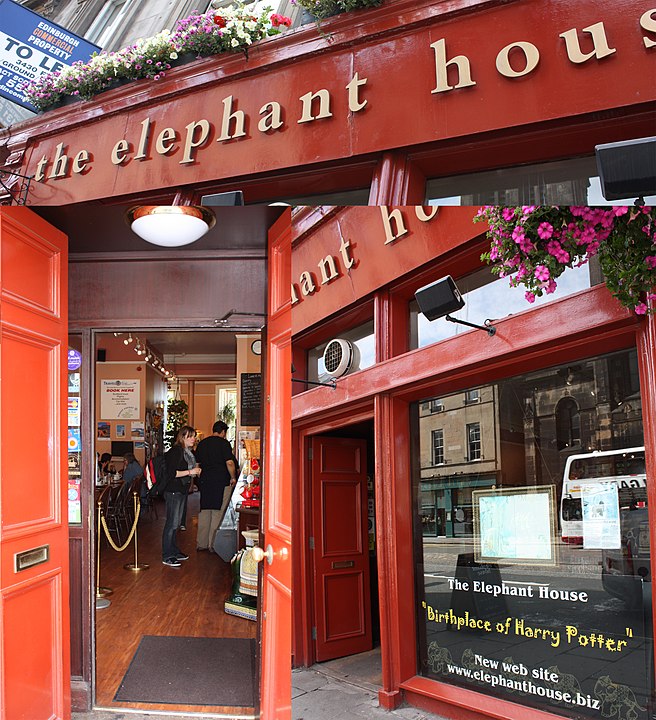
By Nize Nicolai Schäfer - Own work, CC BY-SA 3.0, https://commons.wikimedia.org/w/index.php?curid=9090559
Known as the birthplace of Harry Potter, The Elephant House in Edinburgh is a café that gained worldwide fame thanks to J.K Rowling. Here, the British author began writing the famous book series that has captured the imagination of millions of readers around the world. Today, the cafe is a popular destination for Harry Potter fans and aspiring writers seeking inspiration in the same atmosphere that lulled Rowling as she brought the wizarding world of Hogwarts to life.
In conclusion, historic cafés are much more than just places to enjoy a cup of coffee. They are crossroads of art and culture, places where the brightest minds have gathered to discuss, create and inspire each other. These historic cafés have shaped the cultural history of entire nations and continents. Through their fascinating stories, the works of art that adorn the walls and the unique atmosphere that characterizes them, these places continue to enchant visitors, offering a glimpse of a past rich in creativity and innovation.


